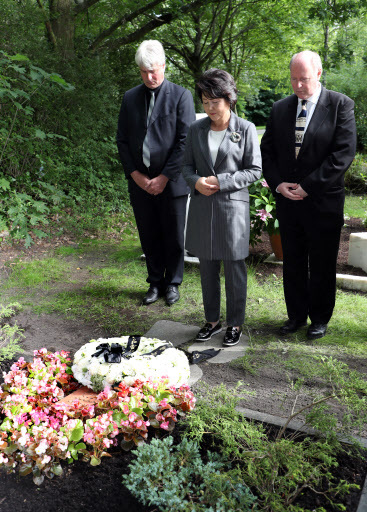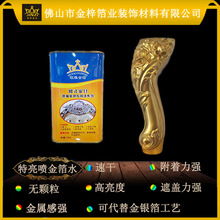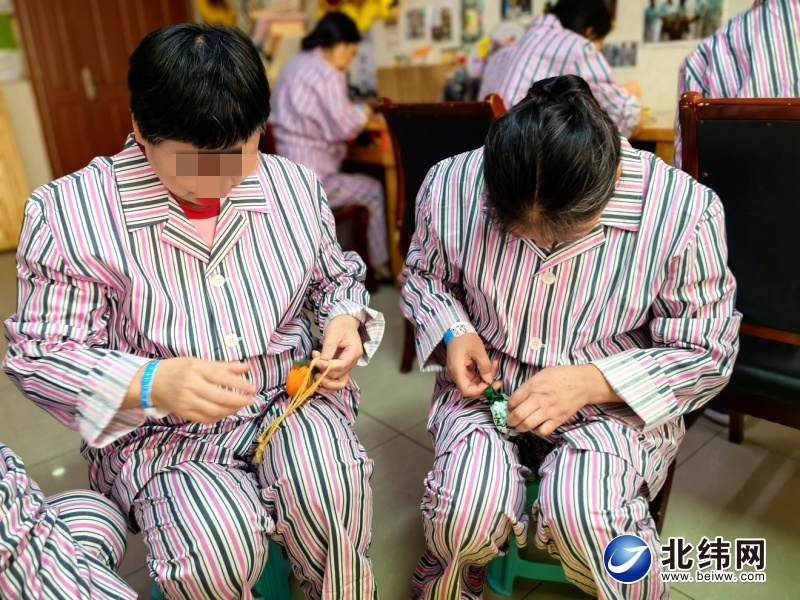First lady visits German gravesite of controversial composer
来源:凌凌漆影视网页版
时间:2024-09-23 05:15:32
First lady Kim Jung-sook visited the gravesite of Korean-German composer Isang Yun in Berlin on Wednesday, local time, in symbolic recognition of the musician who still remains controversial in South Korea for “pro-North Korean activities.”
Kim paid her respects to Yun (1917-1995), who led a life as an internationally acclaimed musician in the European country and was never allowed to visit his home country, as he was convicted of espionage.

“I cried a lot when I heard that Yun was not able to set foot in his hometown even when he came near the waters of Tongyeong on a boat from Japan,” said Kim, who studied vocal music at university.
“I brought a camelia from his hometown for him, who longed for our country’s independence and democratization.”
The first lady was in Berlin, accompanying President Moon Jae-in on a two-day visit to the German capital to meet with German leaders.
The camelia tree was planted at the gravesite.
It is the first time a Korean first lady has visited the site, the presidential office Cheong Wa Dae said.
Kim said she knew Yun’s music well.
“The destruction of tone in his music was unfamiliar, but I took much interest in it. He inspired me a lot when I was studying music,” she said.
Yun, who has penned about 150 works, is recognized for bridging the music of the East and West. Many of his works are still widely performed around the world, such as “Cello Concerto” and “Seven Etudes for Violoncello solo” (1993).
Born in 1917, when the Korean Peninsula was under Japanese colonial rule, the musician was imprisoned for his participation in the resistance movement against Japan in 1943.
Yun enjoyed success in his musical career in France and in Germany in the 1950s and 1960s. But his life turned upside down in 1967, when he was abducted by Korean intelligence agents from his apartment in West Berlin to Seoul. He had visited North Korea four years earlier and had criticized the Park Chung-hee dictatorship.
Yun was tortured and sentenced to life imprisonment on charges of “high treason.” He was later released in 1979 after serving two years in jail, as international pressure built on the government for his pardon. He lived in Berlin till his death.
In his hometown of Tongyeong, an annual music festival, Tongyeong International Music Festival, takes place every spring, commemorating his music and life in exile.
By Ock Hyun-ju (laeticia.ock@heraldcorp.com)
Kim paid her respects to Yun (1917-1995), who led a life as an internationally acclaimed musician in the European country and was never allowed to visit his home country, as he was convicted of espionage.

“I cried a lot when I heard that Yun was not able to set foot in his hometown even when he came near the waters of Tongyeong on a boat from Japan,” said Kim, who studied vocal music at university.
“I brought a camelia from his hometown for him, who longed for our country’s independence and democratization.”
The first lady was in Berlin, accompanying President Moon Jae-in on a two-day visit to the German capital to meet with German leaders.
The camelia tree was planted at the gravesite.
It is the first time a Korean first lady has visited the site, the presidential office Cheong Wa Dae said.
Kim said she knew Yun’s music well.
“The destruction of tone in his music was unfamiliar, but I took much interest in it. He inspired me a lot when I was studying music,” she said.
Yun, who has penned about 150 works, is recognized for bridging the music of the East and West. Many of his works are still widely performed around the world, such as “Cello Concerto” and “Seven Etudes for Violoncello solo” (1993).
Born in 1917, when the Korean Peninsula was under Japanese colonial rule, the musician was imprisoned for his participation in the resistance movement against Japan in 1943.
Yun enjoyed success in his musical career in France and in Germany in the 1950s and 1960s. But his life turned upside down in 1967, when he was abducted by Korean intelligence agents from his apartment in West Berlin to Seoul. He had visited North Korea four years earlier and had criticized the Park Chung-hee dictatorship.
Yun was tortured and sentenced to life imprisonment on charges of “high treason.” He was later released in 1979 after serving two years in jail, as international pressure built on the government for his pardon. He lived in Berlin till his death.
In his hometown of Tongyeong, an annual music festival, Tongyeong International Music Festival, takes place every spring, commemorating his music and life in exile.
By Ock Hyun-ju (laeticia.ock@heraldcorp.com)




![[Diplomatic circuit] German, Israeli embassies remember Holocaust together](http://res.heraldm.com/content/image/2020/02/03/20200203000276_0.jpg)





![[Newsmaker] Father checks into quarantine center to look after 2 kids](http://res.heraldm.com/content/image/2020/02/02/20200202000077_0.jpg)